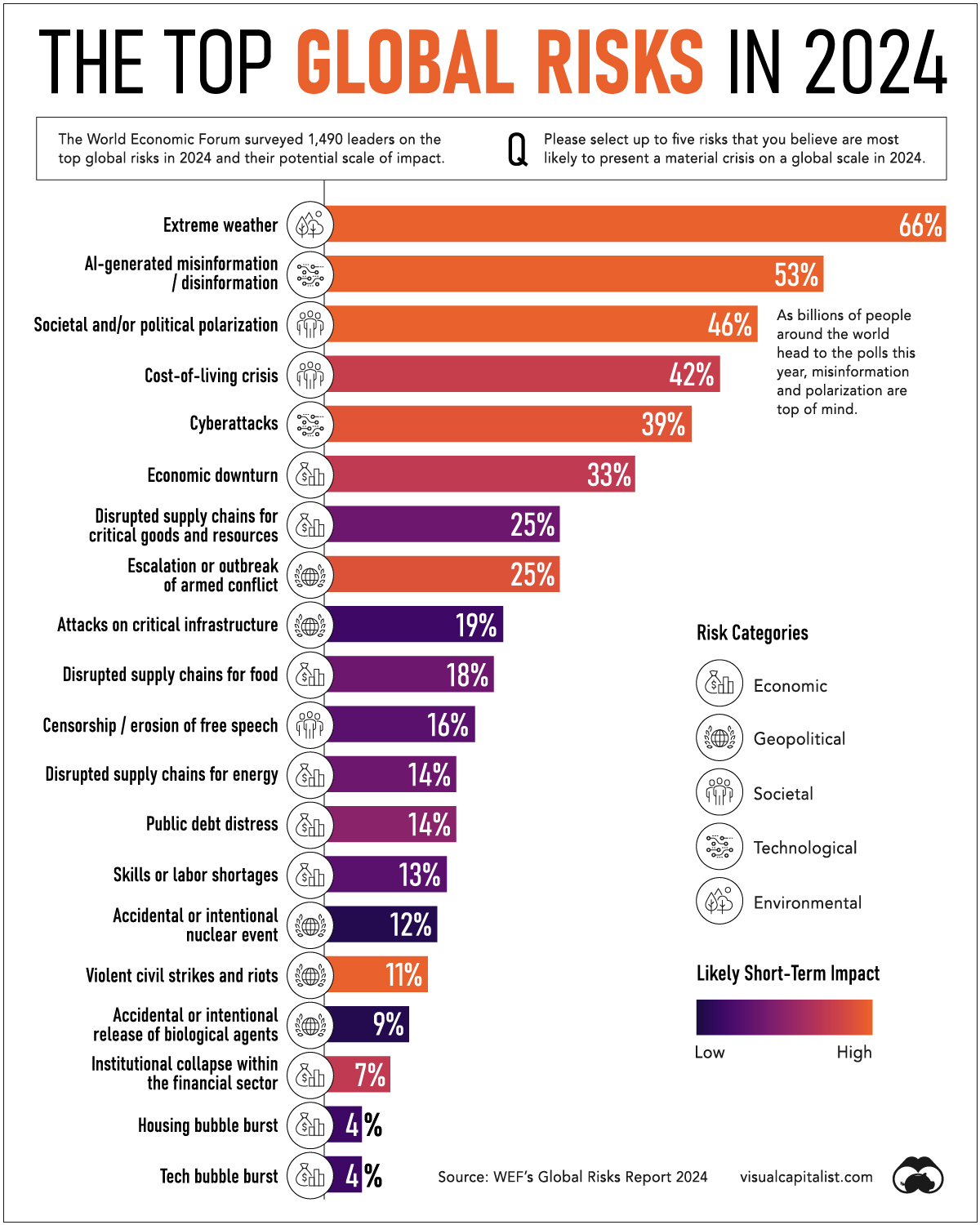Top Global Risks in 2024

Visualizing the Top Global Risks in 2024
What is the global risk landscape in 2024?
Record global temperatures are leading to increasingly harmful impacts, a cost-of living crisis is making everyday life harder for people around the world, and escalating tensions in the Middle East have the potential to widen into a broader regional conflict.
Meanwhile, in 2024 it’s expected to be the world’s biggest election year ever with 4 billion people casting a vote across 60 countries. Will threats such as misinformation and polarization loom large as people head to the polls?
This visualization shows the biggest risks for 2024, based on the World Economic Forum’s annual survey of leaders around the globe.
Global Risk Profile in 2024
Here are the top 20 risks to the global economy, based on a survey of 1,490 leaders.
Leaders were asked to choose up to five risks that are likely to present a material crisis on a global scale in 2024:
Extreme weather poses the biggest risk according to leaders surveyed. It also ranks second overall in terms of severity over the next two years.
Global economies are widely unprepared for the consequences of acute weather, from shocks to food systems to large-scale infrastructure damage. In fact, some research shows that potentially irreversible changes to the planet could be reached by the 2030s if temperatures continue to rise.
Misinformation and disinformation is the second-biggest risk, which could diminish trust and deepen political divides. It also has the potential to undermine global elections, which are slated across the U.S., Russia, India, Mexico, and dozens of other countries.
The threat of misinformation is especially clear given advancements in AI-generated content. It ranks first overall in terms of risk severity across the list.
Interlinked with misinformation is the risk of societal polarization. In the post-pandemic era, political divides have worsened, and these have been exacerbated by economic hardship and a lack of economic opportunity.
 2023 was the year of generative AI. What can we expect in 2024?
2023 was the year of generative AI. What can we expect in 2024?
Additionally, the conflict in the Middle East is severely impacting the livelihood of millions of people, and the recent attack in Lebanon raises questions about the outbreak of a wider war. The escalation of interstate armed conflicts ranks as the eighth-highest risk for the global economy in 2024, and the fifth-most severe.
Future Global Risks
How will global risks transform over the next decade?
By 2034, leaders surveyed believe that environmental risks will be most concerning, making up five of the top 10 risks, by severity:
| 2034 Ranking | Risk | Category |
|---|---|---|
| 1 | Extreme weather events | Environmental |
| 2 | Critical change to Earth systems | Environmental |
| 3 | Biodiversity loss and ecosystem collapse | Environmental |
| 4 | Natural resource shortages | Environmental |
| 5 | Misinformation and disinformation | Technological |
| 6 | Adverse outcomes of AI technologies | Technological |
| 7 | Involuntary migration | Societal |
| 8 | Cyber insecurity | Technological |
| 9 | Societal polarization | Societal |
| 10 | Pollution | Environmental |
AI has the potential to be highly destabilizing to society, presenting some existential risks due to its role as a “force multiplier”, which means that it can increase the effect of a country’s military systems, data analytics, and other capabilities.
From a broader perspective, key structural forces are influencing global risks looking ahead. They include technological acceleration, climate change, shifts in geopolitical power, and a widening demographic divide.















